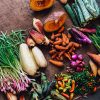The overwhelming and quite unknown fact regarding food supply is that approximately a third of the world’s greenhouse gas emissions stems from food systems and food production. For this reason, the European Union (EU) has taken yet another challenge in its Green Deal, to transform the way in which food is produced and consumed in Europe. With the proposal for a legislative framework known as the ‘Farm to Fork Strategy’, the EU aims to promote sustainability in the food system to reduce its negative environmental footprint, strengthen resilience against food crises whilst maintaining the availability of heathy and affordable food for both current and future generations.
The sustainable Farm to Fork Strategy is a key action presented under the European Green Deal, to achieve climate neutrality by 2050, consisting of various tactics to improve current food production practices in a way in which persons are more conscience about how their food is produced, what they are eating and their quantity. The modernisation of agricultural practices to protect nature and fight climate change is also part and parcel of the Common Agricultural Policy reform for the years 2023-2027 and the EU’s Biodiversity Strategy for 2030.
The Strategy has been organised in such a way that it will foresee three specific initiatives which aim to directly promote; organic farming, more sustainable food consumption and heathy balanced diets, as well as food waste reduction.
Organic farming Action Plan
This method of farming strives for enhancing the soil fertility and its biological diversity with the decrease of pesticides, fertilisers and antimicrobials, which kill or slow the spread of microorganisms such as bacteria, viruses, and fungi needed to replenish the soil’s nutrients. In fact, this Strategy critically proposes a reduction in half the amount thereof, whereas the amount of land that is devoted to organic farming must increase to reach 25% organic production through its land use by 2030, to boost and satisfy the demand of food production, through organic means.
Organic farming is crucial to this day and age since it promotes the responsible use of natural resources, it preserves regional ecological balances, enhances soil fertility and maintains a good water quality. It also highly supports animal welfare, requiring farmers to meet specific behavioural needs of animals, such as the food they are given and a free roaming area of land necessary for their care.
In this regard, the EU has the overall aim of satisfying consumer demand through the adequate trade of trustworthy organic products whilst providing a fair marketplace for all stakeholders involved. Hence, from the 1st of January 2022, the EU also introduced Regulation 2018/848 to strengthen the current rules on organic farming and production as well as its control system. The EU has an important role to improve consumer confidence in organic products and their production, to broaden the way in which citizens react towards organic farming. More information can be accessed here.
Food Security
The consequences of the COVID19 pandemic, through the example of empty shelves in supermarkets, as well as the Ukrainian War, with shortages in energy supply, has exposed Europe to a vulnerable and challenging system in its food chain and food source. Hence, over the past year, accepted by the European Council and the European Parliament, the European Commission has concluded that Europe must safeguard its food supply by also creating a resilient future-proof system to combat potential crises and future disasters of extreme weather events, health issues, shortages of energy and employment and the like, to remain ensuring a wide variety of high-quality food to its citizens[1].
Through the Farm to Fork, the EU “will step up its coordination of a common European response to crises affecting food”[2] namely through the amendment to Regulation 1308/2013 which establishes a common organisation of the markets in agricultural products, and many other ongoing initiatives to improve the EU’s societal and economical preparedness. One method is the EU’s Industrial Strategy which includes a Single Market Emergency Instrument (known as an SMEI), ensuring the free movement of persons and the availability of goods and services for such free persons.
Carbon Farming
As its name implies, absorbing carbon from the atmosphere through farming and forestry will moreover combat climate change, and this idea which was based on the European Commission’s sustainable carbon cycles communication, was approved by the European Council in April 2022. It specifically aims to encourage agricultural practices which will capture carbon from the air, to sustainably store it in soil and biomass. If local authorities within the EU better promote such climate-friendly practices, such as afforestation projects, conserving agricultural areas and maintaining peatlands, by even offering sufficient incentives to farmers and foresters to adopts these mechanisms, sustainability will persist and the Farm to Fork will be better adopted.
Concluding remarks
The Farm to Fork Strategy recognises the large roles that food processors, wholesalers, retailers and hospitality businesses have to stimulate sustainability within the sector of food production, to reduce their negative environmental impacts and to improve the dietary choices of EU citizens. It begins from responsible business and marketing practices in the field, since they are the main drivers of the available and affordable options of food supply, but not only. It involves all actors, including us.
Personal commitments and a more general shift in our habits by opting for, among others; healthier food that requires less meat and more vegetables and fruit, the use of sustainable packaging, reducing our food waste, organic recycling, promoting reusable and recyclable materials for food storage; the list is clearly endless. A small effort by each and every one of us, through better awareness and education on the matter, and also its proactive fulfilment can surely, in the long-term, benefit to succeed in the European climate neutrality challenge.
[1] This is a primary objective set out through article 39 of the Treaty of the Functioning of the European Union (TFEU).
[2] Communication from the Commission to the European Parliament, the Council, the European Economic and Social Committee and the Committee of the Regions – Contingency plan for ensuring food supply and food security in times of crisis – Brussels 12th November 2021.








